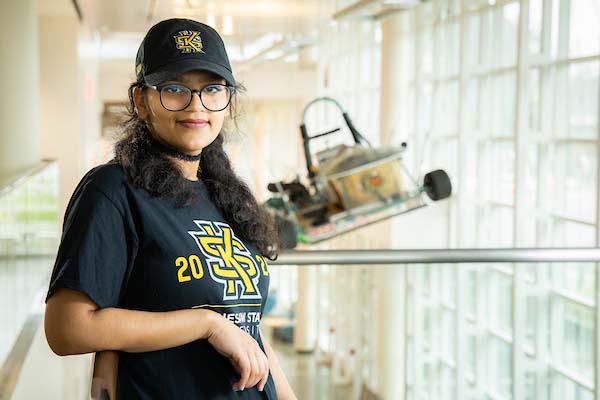 As a high schooler, she was drawn to anything related to the field, from robotics to 3D modeling on computers. However, her college dreams were nearly put on hold as she looked for ways to offset the cost of attending. Then, she received an email from Kennesaw State University’s Southern Polytechnic College of Engineering and Engineering Technology (SPCEET).
As a high schooler, she was drawn to anything related to the field, from robotics to 3D modeling on computers. However, her college dreams were nearly put on hold as she looked for ways to offset the cost of attending. Then, she received an email from Kennesaw State University’s Southern Polytechnic College of Engineering and Engineering Technology (SPCEET).
When it came to picking a college major, Ramisa Ahmed had no doubt her future would be in engineering.
“I wrote so many essays and applied for so many scholarships until finally I saw an email promoting a new program in the engineering college,” said Ahmed, who applied and was subsequently accepted into the Women in Engineering: Graduation and Retention/Recruitment Opportunities for Women (WE-GROW) program. “There was such a sense of relief for me. It took care of all of my financial needs and allowed me to focus on my studies.”
Today, Ahmed is one of nine students this year who are receiving up to $8,800 in scholarship money annually as part of WE-GROW. The effort, launched by SPCEET in October 2019 after receiving a $997,000 grant from the National Science Foundation, aims to support first- and third-year engineering students by providing academic and co-curricular activities focused improving retention and encouraging the pursuit of rewarding and successful engineering careers.
While the initiative focuses to improve gender diversity in Kennesaw State’s engineering programs, it is open to all academically talented students with demonstrated financial need. The programmatic support offered by the initiative will come in the form of guidance and focused efforts by SPCEET faculty, advisors and staff, and industry partners to cultivate a broader sense of community among the students.
“While we concentrate on introducing more women to engineering, we recognize that the male participants gain a better appreciation of the need for more women in the field,” said Lori Lowder, assistant dean for accreditation and assessment. “Just like any other initiative, it’s going to require efforts from all parts to see improvements.”
In addition to the wraparound support services, students are afforded opportunities to participate in undergraduate research and STEM outreach efforts at local schools, and meet with women who are already in the field.
“I was particularly struck by the number of women engineers I’ve already met through the industry outreach events,” said Ahmed, who studies mechanical engineering. “It’s not often that you see women hold high positions for STEM jobs, and it’s always been a goal of mine to be that same kind of role model for other girls hoping to study engineering.”
Like Ahmed, computer engineering student Kevin Toyle said the face-to-face time with industry professionals and faculty mentors have been some of the most impactful aspects of the WE-GROW initiative. Recent industry meet-and-greets have involved professionals from a variety of industries, including those representing Siemens and NASA.
Toyle also likes giving back to the younger generation, taking advantage of an opportunity to serve as a guest judge in an elementary school science fair as part of WE-GROW.
“It’s nice to connect with people, especially kids who are starting to explore STEM fields,” he said. “I received my inspiration at a young age, and I enjoy seeing how the next generation finds theirs.
As WE-GROW continues to evolve, Lowder said the engineering college expects to extend services to the larger student body to build upon student success.
“We are looking to make this a part of our larger student recruitment strategy,” she said. “But we also want to make sure that we are doing our best to support them once they’re here and make sure they graduate en route to fruitful careers.”

